|
|
|
Sort Order |
|
|
|
Items / Page
|
|
|
|
|
|
|
| Srl | Item |
| 1 |
ID:
084030
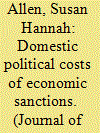

|
|
|
|
|
| Publication |
2008.
|
| Summary/Abstract |
While a great deal of attention has been to paid to whether or not economic sanctions work, less energy has been devoted to exploring the causal mechanisms that lead to the success or failure of sanctions policies. Often, it is assumed that the population is one important source of political costs for targeted leaders, but this assumption has not been tested. Are sanctions related to an increase in antigovernment activity? How does the domestic political system of the targeted state affect the likelihood of this antigovernment behavior? The findings presented here suggest that sanctions may increase antigovernment activity, but that increase is mitigated by the domestic political structures of the target state. In autocratic targets, political violence is less likely to occur when sanctions are in place. For sanctions against autocratic states to be costly, it appears that the political costs needed to alter behavior must be generated internationally rather than domestically.
|
|
|
|
|
|
|
|
|
|
|
|
|
|
|
|
| 2 |
ID:
186102


|
|
|
|
|
| Summary/Abstract |
After the Fukushima nuclear meltdown, the Angela Merkel government in Germany officially announced its decision to permanently shut down all of its seventeen nuclear reactors. In closer proximity to Fukushima, the Lee Myung-bak government in South Korea expanded its nuclear energy program with specific plans to construct more nuclear reactors in various locations and pursued more export opportunities. It was only in 2017 that the South Korean government, under President Moon Jae-in, announced a gradual phase-out of nuclear power plants in South Korea. What explains the contrasting paths of the German and South Korean nuclear energy programs in the immediate aftermath of the Fukushima nuclear disaster? Why did the same external shock prompt sudden policy reversal in Germany while it took six more years for South Korea to turn its course? While existing studies are helpful in accounting for the rise of particular energy policies, they are insufficient for explaining the causes and specific timing of major policy reversals in the face of external crises. Building upon the literature on political opportunity structures, this article argues that the emergence of new political opportunities and the shift in political framing with respect to nuclear energy caused nuclear phase-out in both countries. A closer look at the two national cases offers an opportunity to delineate the domestic political process of nuclear energy policymaking and evaluate the role of exogenous shocks, such as a major nuclear disaster, in shifting political opportunity structure and reshaping the perceptions of energy security and political risks.
|
|
|
|
|
|
|
|
|
|
|
|
|
|
|
|
| 3 |
ID:
152270
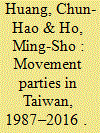

|
|
|
|
|
| Summary/Abstract |
This article examines the development of “movement parties” in Taiwan by applying the political opportunity perspective to understand how external conditions impacted their electoral path. We explain the rise and fall of movement parties by changes in electoral system, level of movement activism, and the permeability of the DPP.
|
|
|
|
|
|
|
|
|
|
|
|
|
|
|
|
| 4 |
ID:
137207
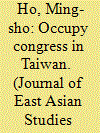

|
|
|
|
|
| Summary/Abstract |
In opposition to a free trade pact with China, Taiwan's Sunflower Movement erupted in spring 2014 and occupied the national legislature for twenty-four days. Drawing from the recent debates on the relation between social movements and the state, I elaborate a revised polity model that focuses on the effects of elite disunity, threat, and movement strategy. The Sunflower Movement originated from a tactical misstep by the ruling party that created an immediate sense of threat from proposed closer economic ties with China, thereby facilitating protest mobilization. Student protesters were able to seize the national legislature because of an internal split within the ruling party and support from the opposition party. However, the failure to further exploit these favorable opportunities exposed the movement to government repression. Fortunately for the movement, the disunity among elites helped the activists manage a dignified exit, which they could claim as a success.
|
|
|
|
|
|
|
|
|
|
|
|
|
|
|
|
| 5 |
ID:
127836
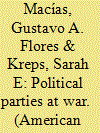

|
|
|
|
|
| Publication |
2013.
|
| Summary/Abstract |
What determines when states adopt war taxes to finance the cost of conflict? We address this question with a study of war taxes in the United States between 1789 and 2010. Using logit estimation of the determinants of war taxes, an analysis of roll-call votes on war tax legislation, and a historical case study of the Civil War, we provide evidence that partisan fiscal differences account for whether the United States finances its conflicts through war taxes or opts for alternatives such as borrowing or expanding the money supply. Because the fiscal policies implemented to raise the revenues for war have considerable and often enduring redistributive impacts, war finance-in particular, war taxation-becomes a high-stakes political opportunity to advance the fiscal interests of core constituencies. Insofar as the alternatives to taxation shroud the actual costs of war, the findings have important implications for democratic accountability and the conduct of conflict.
|
|
|
|
|
|
|
|
|
|
|
|
|
|
|
|
| 6 |
ID:
182664
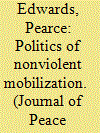

|
|
|
|
|
| Summary/Abstract |
Nonviolent resistance is considered one of the most effective methods of bringing about political change. Yet empirical research on how nonviolent campaigns emerge is limited. This article considers two sets of considerations which influence the strategic decision of a campaign to use nonviolent or violent methods: interactions with the state and campaign resources. Campaigns are concerned about the risk of repression from the state and are more likely to choose nonviolence when they believe the state will accommodate their demands. Open political competition signals likely accommodation. Campaigns’ nonviolent tactics are more effective when they possess social movement resources, though high levels of movement resources threaten the state. The argument implies political competition and social movement resources are associated with a higher likelihood of a campaign using nonviolence, though the relationship with social movement resources diminishes at high levels. Implications of the argument are tested on a sample of contentious campaigns from 1945 to 2006. Political competition and social movement resources are related as expected to the use of nonviolence. However, an extension shows these factors do not account for the advantage of nonviolent methods, particularly in triggering backlash protests, once a campaign is under way. An original ordinal measurement strategy for campaign methods suggests the intensity of violence and nonviolence are likewise unrelated to competition and resources.
|
|
|
|
|
|
|
|
|
|
|
|
|
|
|
|
| 7 |
ID:
121206


|
|
|
|
|
| Publication |
2013.
|
| Summary/Abstract |
This article focuses on environmental controversy in a Chinese rural community. It shows that Chinese villagers may protest against anticipated pollution if the environmental threat is effectively framed. In the face of real and serious pollution, villagers may seek to redress environmental grievances by piggybacking on politically favourable issues. However, when the pollution is caused by fellow villagers, environmentally concerned villagers may remain silent owing to the constraints of community relations and economic dependency. These findings suggest that the relationship between pollution and protest is context-dependent.
|
|
|
|
|
|
|
|
|
|
|
|
|
|
|
|
| 8 |
ID:
124403


|
|
|
|
|
| Summary/Abstract |
This article critically examines the policy capacity crisis in post- 1997 Hong Kong. In particular, it provides a framework that allows for a more sophisticated analysis of new social movements (NSMs) and their role in challenging the government in policy making and implementation. A number of studies examining recent campaigns conducted by NSMs reveal that the social activists involved have distinctive goals, organizational structures, and political styles, and that the distinctiveness of NSMs has challenged the traditional ways in which public policy has been made, which emphasized rationality, scientific analysis, and policy coherence. However, this article argues that the policy capacity crisis cannot be explained purely in terms of the rise of NSMs. The form and strength of their challenge to policy capacity can only be fully understood in relation to the prevailing political structures which define the connected set of political opportunities/constraints facing the protest groups. In particular MSMs only become relevant in mobilizing and intensifying antagonistic forces when their values and actions are mediated by the structure of political opportunities. Moreover, any effect on government policy derived from confrontational action also has to be mediated by the political structures. In short, the structural opportunities/constraints enshrined in particular policy areas are equally, if not more, significant than the internal dynamics of NSMs in understanding the impact of such movements on public policy. Hence, there is no real reason to assert that the rise of NSMs necessarily poses a considerable challenge to the policy capacity of the Hong Kong government.
|
|
|
|
|
|
|
|
|
|
|
|
|
|
|
|
|
|
|
|
|